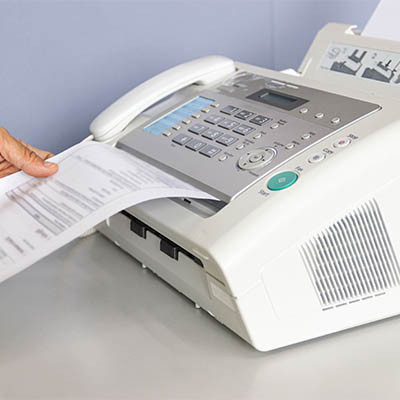
- Home
- About Us
- IT Services
- Understanding IT
- News & Events
- Blog
- Support
- Contact Us
- Register
- Login
Capstone Works Blog
Sticking With Fax Doesn’t Necessarily Make Your Texas Medical Practice Compliant
The fax machine. Love it or hate it, it’s been a staple for many businesses, especially those within the healthcare industry. One particular reason why fax is so popular for medical facilities is because it is assumed that fax machines are secure, whereas digital files need to be secured. That said, it’s time to rely less on outdated technologies like fax, especially when dealing with medical records.
Your Practice’s Health Records are Probably Already Digital Anyway
In our experience, most of the healthcare industry is already using an EHR (Electronic Health Record) or EMR (Electronic Medical Record) system. This is good news. As of 2017, around 80 percent of all American healthcare providers were going digital, and as of last year, that number is closer to about 90 percent.
However, about 9 out of 10 healthcare offices still use fax machines to send and receive an overwhelming majority of their documents. There is a disconnect here—you don’t need fax machines to handle the secure transmission of digitized documents.
But Fax Machines are Inherently Secure, Right?
Fax has certainly been an industry darling for decades, and part of the reason is that everyone is still using it. When HIPAA (The Health Insurance Portability and Accountability Act) was created, the goal was to protect the medical information of patients both while transmitting information and while storing it. Traditional fax machines generally comply with this, but not all fax machines are inherently HIPAA compliant.
Many practices (or any business that still relies on fax) often switch to more modern IP fax solutions. This can help save money, and these fax machines are typically more robust and offer much-needed features that the older, traditional fax machines were lacking. Unfortunately, these types of fax machines aren’t always configured to be HIPAA compliant and become a big liability for healthcare providers.
IP Fax systems, in order to mitigate error and ensure security, need to have real-time data transfer capabilities, document encryption, and the ability to be able to confirm receipt on a page-by-page basis. These capabilities are really important, especially when time and quality is a factor.
Mistakes Can Happen Because of Fax Machines
In an article by the Joint Commission Center for Transforming Healthcare, it’s stated that “an estimated 80% of serious medical errors involve miscommunication between caregivers during the transfer of patients.” Some of the other side effects are delays in treatment, increased hospital stay, and even inappropriate treatment. In other words, these are serious problems.
While the article touches on some solutions like standardizing your information and providing education and coaching to your staff, a portion of these miscommunication issues are attributed to missed or delayed faxes.
No, It’s Probably Not the End of Fax (Yet)
We’re not saying you should ditch your fax machine. If we did, most healthcare workers would scoff. It’s a huge part of the industry, and most practices have it because that’s what everyone else is using. Communication between different offices, facilities, pharmacies, and everyone else in the industry is primarily done via fax and it will likely be a while before everyone fully switches over to a more modern, flexible solution that ties directly in with EHR.
Until then though, it’s important to reduce the chance of mistakes and ensure that all of your technology solutions are secure and compliant. This is particularly important with cybercriminals targeting Texas hospitals.
Capstone Works, Inc. can help your healthcare practice meet HIPAA compliance. We’re familiar with working with particularly sensitive environments and can make technology drive your business forward. Give us a call at (515) 343-8891 x2 to talk to us about your IT concerns.
About the author
Capstone Works, Inc. has been serving the Cedar Park area since 2001, providing IT Support such as technical helpdesk support, computer support, and consulting to small and medium-sized businesses.
Comments
Mobile? Grab this Article!
Tag Cloud
- You are here:
- Home /
- Blog /
- Capstone Works, Inc. /
- Sticking With Fax Doesn’t Necessarily Make Your Texas Medical Practice Compliant
Latest News & Events
Account Login
Contact Us
Learn more about what Capstone Works can do for your business.
(512) 343-8891
715 Discovery Blvd
Suite 511
Cedar Park, Texas 78613
